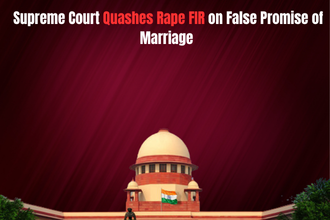Introduction
The Supreme Court of India has once again reaffirmed its commitment to preventing the misuse of criminal law. In the case of Surendra Khawse v. State of Madhya Pradesh & Anr., the Court quashed an FIR and chargesheet filed against a municipal employee who was accused of rape on the pretext of marriage. The Court strongly observed that the complaint appeared to be an *“afterthought” and was used as a “vehicle for vengeance” following administrative action against the complainant.
This judgment highlights the delicate balance courts must maintain: safeguarding genuine victims while ensuring that false or mala fide prosecutions do not become tools of harassment.
Case Background
The facts of the case are unusual and important for understanding why the Supreme Court intervened:
- The complainant was employed as a computer operator in a municipal corporation.
- She alleged that her colleague, an Assistant Revenue Inspector, promised to marry her and then entered into a sexual relationship.
- Despite being married and having a child, she claimed that the accused forced himself on her on 15 March 2023 under the false assurance of marriage.
- The relationship allegedly continued until April 2023, after which the accused refused to marry her and suggested she marry someone else.
- Following this refusal, she filed an FIR under Sections 376 and 376(2)(n) of the Indian Penal Code (IPC).
However, the twist came from the accused’s side. Before the FIR was filed, he had already submitted multiple complaints against the complainant, alleging harassment and threats. These representations led the municipal authorities to issue a show-cause notice to the woman on *6 July 2023, warning her of disciplinary consequences. Interestingly, the FIR was filed only *after this notice, nearly four months after the alleged incident.
Supreme Court’s Observations
The Bench of Justice Sanjay Karol and Justice Nongmeikapam Kotiswar Singh carefully examined the timeline and circumstances. The Court made several important findings:
- Delay in filing FIR – The complainant did not approach the police immediately after the alleged refusal to marry. Instead, the FIR was lodged months later, and only after disciplinary action threatened her employment.
- Counter-complaints by the accused – The accused had already lodged complaints with municipal and police authorities, portraying himself as a victim of harassment.
- Suspicion of ulterior motive – The sequence of events raised the possibility that the FIR was filed not out of genuine grievance but as retaliation to the show-cause notice.
- Abuse of process – The Court emphasized that the criminal justice system cannot be misused as a tool for personal vendetta.
The judges observed:
“The fact that the FIR was lodged only after the issuance of a show-cause notice leaves open a gaping possibility that the same was lodged as an afterthought and was a vehicle for vengeance for the impending consequences.”
Legal Principles Applied
The Supreme Court relied on well-established precedents to support its ruling:
- State of Haryana v. Bhajan Lal (1992): This landmark case laid down seven categories of circumstances where courts can quash criminal proceedings, including cases instituted with mala fide intent or where allegations are inherently improbable.
- Mohd. Wajid v. State of U.P. (2023): The Court reiterated that in cases of potentially vexatious prosecution, judges must look beyond the FIR and examine the broader circumstances.
By applying these doctrines, the Bench concluded that the case was a textbook example of abuse of criminal law.
Supreme Court’s Verdict
The Supreme Court quashed both the FIR and the chargesheet, bringing relief to the accused. The judgment makes it clear that courts must intervene where criminal proceedings are initiated with bad faith or ulterior motives.
Why This Judgment Matters
This case has wider implications for Indian criminal law and society.
1. Curbing Misuse of Rape Laws
The law against rape on the false promise of marriage exists to protect genuine victims. However, the Court’s intervention ensures it cannot be misused to settle personal or professional scores.
2. Timely Action is Critical
The delay of four months in filing the FIR was seen as evidence of afterthought. Victims must act promptly if they are genuinely aggrieved, otherwise courts may doubt their credibility.
3. Balance Between Rights of Accused and Victim
This judgment reinforces that while protecting women from exploitation is important, courts must also protect innocent individuals from false accusations.
4. Guidance for Future Cases
By invoking the Bhajan Lal doctrine, the Court sent a strong message: when allegations are dubious, courts must not hesitate to quash proceedings to prevent harassment.
Broader Social & Legal Context
The debate around rape on the pretext of marriage has been ongoing in India. Courts have distinguished between two scenarios:
- Genuine deception: where a man never intended to marry but used the promise to obtain consent. This is treated as rape.
- Relationship disputes: where a consensual relationship breaks down, and allegations of false promise emerge later. These cases often fall into the grey area of law.
The present judgment falls into the second category, where the Court found that the complaint lacked bona fides.
Conclusion
The Surendra Khawse judgment is a landmark reminder that criminal law cannot become a weapon of revenge. By calling out the FIR as a “vehicle for vengeance”, the Supreme Court protected the integrity of the justice system.
For genuine victims of exploitation, the law remains a shield. But for those attempting to misuse it, the judiciary has drawn a firm line. This balance between protection and prevention of abuse ensures fairness for both complainants and accused, reinforcing the fundamental principle of justice in India.
Also Read
Supreme Court Reprimands Magistrate for “Abdicating Jurisdiction” After Missing Deadline



